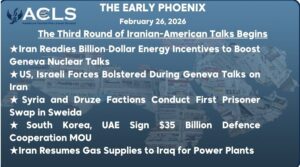Houthi Attacks Thwarted, Rising Toll in Israel-Hamas Conflict, Lebanon’s Emerging Front, and Regional Deals Amidst Wartime Turmoil
TOP HEADLINES:
- U.S. and UK Forces Thwart Houthi Attack on International Shipping in the Red Sea.
- 147 Palestinian Dead in 24 Hours.
- Sudanese PM Supports Negotiations for Continued U.S. Troop Presence in Iraq.
- Lebanese Army Discovers Israeli Fuel Lines Near Southern Towns.
- Ethiopian-Somaliland Deal Sparks Regional Security Concerns.
=======================
★ YEMEN
- U.S. and UK Forces Thwart Houthi Attack on International Shipping in the Red Sea. On January 9, Iranian-backed Houthis from Yemen launched a coordinated attack targeting international shipping lanes in the Southern Red Sea using Iranian-designed drones, cruise missiles, and a ballistic missile. This assault, aimed at dozens of merchant vessels, was successfully countered by American and British naval forces, including the USS Dwight D. Eisenhower and the UK’s HMS Diamond, neutralizing 18 drones, two cruise missiles, and a ballistic missile without causing any injuries or damage. This marks the 26th Houthi attack on Red Sea shipping routes since November 19. The U.S. Central Command highlighted the Houthis’ persistent threats to global trade, as these assaults prompted changes in shipping routes, impacting up to 12% of global commerce. In response, the U.S. has spearheaded a multinational naval coalition to secure maritime traffic in the region, encouraging a gradual return to safer navigation through the strategic Bab al-Mandab Strait.
- Oman Thwarts Drone Smuggling Attempt from UAE to Yemen. Oman’s customs authorities intercepted a shipment of drones coming from the UAE and destined for Yemen at the Hafeet border crossing. The discovery raised concerns about drone attacks by Houthi rebels in the Red Sea, disrupting global trade and causing inflation fears.
=======================
★ ISRAEL & PALESTINIAN TERRITORIES
- High Death Toll, Humanitarian Crisis, and International Legal Challenges. Recent reports from the Palestinian Ministry of Health in Gaza highlight a severe health crisis, attributing it to Israel’s use of banned weapons and intense bombings. As of January 10, 2024, Gaza has witnessed 147 deaths within 24 hours, contributing to a total of 23,357 fatalities since October 7. Injuries have affected over 59,410 individuals, many of whom face difficulties accessing medical care. The Israeli military persists in its campaign against Hamas, focusing on Khan Yunis and Al Maghazi. This operation includes targeting more than 150 Hamas locations, resulting in casualties and the discovery of tunnels and weaponry. Additionally, Israeli forces fatally shot an unarmed Palestinian in Beit Rima, West Bank, suggesting a trend of civilian targeting. The humanitarian situation, particularly in Gaza, is worsening, with its health infrastructure nearing collapse. The Israeli army reports the loss of one soldier in the past day, raising its total fatalities in the Gaza conflict to 186, with another soldier injured in central Gaza. Simultaneously, Israel faces genocide accusations at the International Court of Justice in The Hague, marking its first appearance in the court. South Africa has charged Israel with committing genocide in Gaza, sparking concerns about diplomatic repercussions and the ongoing conflict with Hamas. Statements from Israeli ministers have become central to these allegations. Furthermore, an Israeli delegation is in Cairo discussing a hostage deal, while the US foiled a major Houthi attack in the Red Sea. The IDF revealed a senior Hamas official’s luxurious lifestyle, contrasting with Gaza’s plight. Israeli actions included striking Hezbollah targets in Lebanon and intercepting hostile aircraft. Diplomatic tensions arose with discussions on Palestinian statehood and accusations against Israel at the International Court of Justice. The Israeli parliament reduced the budget for war efforts, and the IDF expanded operations in Gaza.
=======================
★ IRAN
- Iran Supplies Advanced Attack Drone to Russia for Ukraine Conflict. Iran has developed the Shahed-107 attack drone, equipped with reconnaissance capabilities, and sold it to Russia for over $2 million. Russia’s use of Iranian drones and the potential supply of ballistic missiles from Iran to Russia for the Ukraine conflict raise concerns and pose a threat to Ukraine’s air defenses.
- Iran and Russia Express Doubts Over US Yemen Resolution. Iranian and Russian foreign ministers expressed skepticism regarding the US’ UN Security Council resolution on Yemen, seeing it as a pretext for expanding American military presence in the Red Sea region. They also discussed Gaza and the need for peace in the region.
- Iran Accuses US of Enabling Israeli Attacks on Gaza. Iran’s UN ambassador criticized the United States for repeatedly using its veto power to allow Israel to continue its indiscriminate bombings on Gaza. He called for a sustainable ceasefire and humanitarian assistance to prevent further civilian suffering.
- OIC Parliamentary Meeting in Iran Discusses Gaza Crisis. The Parliamentary Union of the Organization of Islamic Cooperation (PUIC) holds an extraordinary meeting in Tehran, addressing the ongoing Israeli attacks on Gaza. The conference focuses on parliamentary cooperation for Palestine, with Iran’s Parliament Speaker Mohammad Baqer Qalibaf leading the discussions.
- Fire and Explosion at Iranian Cosmetics Factory Injures 53. A massive fire and explosion, possibly caused by a gas leak, injured 53 people at a cosmetics factory near the Iranian capital, Tehran, according to official Iranian media reports. Some of the injured individuals are in critical condition, and preliminary investigations suggest that a gas leak in parts of the production line at the factory was the cause of the explosion.
=======================
★ IRAQ
- Sudanese PM Supports Negotiations for Continued U.S. Troop Presence in Iraq. In a surprising turn of events, Sudanese Prime Minister Muhammad Shiaa al-Sudani, despite announcing plans for the withdrawal of American forces from Iraq, secretly expressed his willingness to negotiate the continued presence of U.S. troops. This development is significant for the Biden administration’s efforts to combat ISIS and counter Iranian influence in the region, although the complex political landscape in Iraq may pose challenges to this outcome. Meanwhile, Maj. Gen. Joel Vowell, the head of the U.S.-led coalition in Iraq and Syria, met with Iraq’s Kurdistan Region President Nechirvan Barzani to discuss recent drone attacks by Iran-backed militias and the protection of coalition forces in Iraq. These talks come amid pressure from Iraq’s Prime Minister Mohammed Shia al-Sudani to establish a timeline for the withdrawal of over 2,500 coalition troops, raising concerns over the future of the U.S. presence in the country. Additionally, there are hints that the U.S. could use economic leverage, possibly through control over Iraqi oil export revenues, to ensure the retention of its troops in Iraq, particularly if the Iraqi government considers their withdrawal.
- Escalating Drone Attacks on Coalition Forces in Iraq. Erbil and Harir Bases Targeted. In recent developments, coalition forces successfully thwarted a drone attack on Erbil International Airport, intercepting two explosive-laden drones aimed at the airport. Meanwhile, the Harir base in northern Iraq, hosting international coalition forces, was targeted in a separate drone attack. These incidents come in the wake of escalating tensions, as the Pentagon reports a total of 127 attacks on U.S. facilities in Iraq and Syria since the regional escalation began. These attacks, involving rockets and drones, are believed to be carried out by Iran-affiliated groups, posing a significant security challenge in the region.
- Iraq Continues Economic Support to Iran Despite US Pressure. The Secretary-General of the Iran-Iraq Joint Chamber of Commerce, Jahanbakhsh Sanjabi Shirazi, reveals that there has been no special meeting between Iraqi bank officials and the US regarding suspending foreign currency exchanges with Iran. He emphasizes that trade between Iran and Iraq remains unaffected by these discussions, indicating that both countries have their policies to address the situation.
- Qatar Offers to Build $2 Billion Power Station in Iraq. Qatar’s Orbakon Trading and Contracting company has proposed reconstructing a 2.1-gigawatt thermal power station in northern Iraq, benefiting several provinces. The project, estimated to cost at least $2 billion and take a minimum of three years to complete, aims to reduce Iraq’s reliance on Iranian gas imports for electricity production. This initiative is part of broader agreements between Qatar and Iraq, including the development of energy projects and modern urban areas as part of Iraq’s development road.
- Corruption of Millions Uncovered in Iraq Linked to Saddam Regime. Iraq’s “Recovery of Iraq Funds” fund has revealed corruption involving the withdrawal of up to 600 million dinars from the dissolved “National Council” account after April 9, 2003. An investigation revealed unauthorized cash withdrawals, raising suspicions of illegal actions during Saddam Hussein’s regime. The case has been referred to the Federal Commission of Integrity for further investigation.
=======================
★ LEBANON
- Israel Claims Killing Hezbollah’s Drone Unit Leader, Hezbollah Denies. Israel announced the killing of the leader of Hezbollah’s drone unit in a drone strike in southern Lebanon, while Hezbollah denied the claim. Israel’s military spokesman, Daniel Hagari, stated that Ali Hussein Barghouti led dozens of drone attacks against Israel. However, Hezbollah’s media relations denied this assertion, stating that Barghouti had not been the target of any assassination attempt.
- Israeli Airstrikes Leave One Dead, One Injured in Southern Towns. The Lebanese National News Agency reported that Israeli aircraft conducted airstrikes on the outskirts of the towns of Naqoura and Jabal al-Lubnanah in southern Lebanon, resulting in one fatality and one injury. Hezbollah had previously announced its drone attack on an Israeli military base in Safed, escalating tensions in the region. The Israeli military confirmed airstrikes on Hezbollah military infrastructure in Kfar Kila and a drone facility in the village of Yaroun in southern Lebanon.
- Lebanese Army Discovers Israeli Fuel Lines Near Southern Towns. The Lebanese army, along with UNIFIL, uncovered three fuel hoses extending from Israel to Lebanese territory, used to pump flammable materials. The army dismantled them amid Israeli strikes, with no reported injuries. Additional similar hoses were found near Aita al-Shaab town, prompting the army to maintain border monitoring in coordination with UNIFIL.
- Hochstein Excludes Shebaa Farms from Agenda, New U.S. Ambassador to Lebanon Arriving. U.S. mediator Amos Hochstein will meet Deputy Speaker Elias Bou Saab in a European capital, with a focus limited to the Blue Line, excluding the Shebaa Farms issue. New U.S. Ambassador Lisa Johnson will arrive in Beirut, working as charge d’affaires until a new Lebanese president is elected, visiting political forces to mitigate tensions in the southern region.
- Berri Condemns Israeli Violations, Mikati Advocates Negotiation. Parliament Speaker Nabih Berri criticizes Israeli violations of U.N. Resolution 1701 and international rules during a meeting with U.N. officials. Caretaker Prime Minister Najib Mikati calls for an end to Israeli aggression and expresses Lebanon’s readiness for negotiations to achieve stability in southern Lebanon and the northern border of occupied Palestine.
- Lebanon Ready for Long-Term Border Stability Talks. Lebanese acting Prime Minister Najib Mikati stated that Lebanon is prepared to engage in negotiations for long-term stability along its southern border with Israel. He emphasized the country’s desire for permanent peace but expressed concerns over warnings of war from international envoys. Mikati did not specify the format of the negotiations.
=======================
★ The Arabian Gulf
- Saudi Arabia’s Secret Meeting on Ukraine Peace Talks. Saudi Arabia covertly hosted a meeting last month with Ukraine, G7 nations, and select Global South countries, as reported by Bloomberg. This gathering aimed to rally support for Kiev’s conditions to initiate peace negotiations with Russia. Attendees included national security advisors, with the secrecy intended to ease participants’ concerns. The meeting followed larger public events countering Moscow’s narrative and promoting willingness to negotiate an end to the conflict. Ukraine is advocating for a global peace summit this year, amidst intensified Russian military actions. The Riyadh meeting, which included officials from India, Saudi Arabia, and Turkey, acknowledged Ukraine’s right to self-defense and upheld key UN principles. However, notable countries like China, Brazil, and the UAE were absent, and no substantial progress was reported.
=======================
★ EGYPT
- Ethiopian-Somaliland Deal Sparks Regional Security Concerns. Ethiopia’s recent agreement with Somaliland, a separatist region, has raised significant security concerns in the Horn of Africa, the Red Sea, and for Egypt. Somalia reacted by nullifying the agreement and coordinating with Egypt and the Arab League. Dr. Abdul Rahman Badiou, a senior advisor to the Somali president, highlighted the deal’s potential to revive extremist groups like Al-Shabaab and ISIS, and its violation of Somali sovereignty. Ethiopia’s move, seen as exploiting Somaliland’s quest for international recognition, also aligns with its historical ambition for Red Sea access. The deal’s fallout includes Somali national unification and legislative actions to counteract potential conflicts in the region. Egypt has responded by supporting Somalia’s sovereignty and territorial integrity, emphasizing the deal’s potential to ignite new conflicts in the Horn of Africa.
- Egypt Reinitiates Mediation in Gaza Conflict. Egypt has officially resumed its role as a mediator between the Israeli government and Gaza’s factions, following a pause due to the assassination of Hamas’s deputy head, Saleh Al-Arouri, in Beirut. Prior to the assassination, Hamas had submitted a comprehensive response to Egypt’s initiative to halt the war, including necessary amendments for mediation. Concurrently, Qatar continues its mediation efforts to cease hostilities in Gaza. A high-level Israeli delegation arrived in Cairo to discuss the release of Israeli prisoners held in Gaza, with the resistance demanding guarantees against renewed warfare post-release.
=======================
★ SYRIA
- U.S. Forces Attacked in Syria. U.S. bases in Syria, specifically in the Conico gas field and Hasakah countryside, experienced multiple attacks involving drones and missiles, with no reported human casualties. These incidents align with the 127 attacks documented by the Pentagon on American facilities in Syria and Iraq since regional tensions escalated due to the war in Gaza. Local sources attribute some attacks to Iranian-backed militias and the “Islamic Resistance in Iraq,” stating their actions are responses to Israeli operations in Gaza. Concurrently, Syrian regime forces, supported by Russian airpower, intensified operations against ISIS in the Palmyra desert following attacks on military personnel. The region continues to see frequent explosions of war remnants, causing civilian casualties.
- Syria’s Economic Struggle Amid Iran’s Debt and Jordan’s Anti-Drug Campaign. Leaked documents reveal Syria’s severe economic difficulties, highlighting its inability to repay debts to Iran amidst sanctions and a dire need for reconstruction funds. Iran, having provided significant aid and oil, struggles to recover debts due to Syria’s financial crisis. Concurrently, the Jordanian army intensifies its crackdown on drug trafficking along the Syrian border, arresting smugglers and targeting smuggling operations, amid accusations of Syrian and Iranian-backed groups’ involvement in the surge of cross-border smuggling activities.
=======================
★ TURKIYE
- Türkiye’s Strategic Moves: U.S. Diplomacy, Economic Revival, and Mineral Cooperation. U.S. Secretary of State Antony Blinken, concluding his Middle East tour that began in Türkiye, emphasized in Israel the potential for Türkiye to play a key role in post-war Gaza security. Concurrently, Türkiye’s economy team, led by Central Bank Governor Hafize Gaye Erkan, is set for high-profile investor meetings in the U.S., signaling a policy shift towards tighter monetary controls and inflation management. Furthermore, Türkiye declares readiness to collaborate globally, especially with African and Asian countries, in the field of critical minerals, underscoring its ambition to leverage its rich rare earth elements resources for strategic and economic gains.
=======================
📌 Incase you missed it,
📰 THE EARLY PHOENIX January 9, 2024
=======================
🔗 Follow the latest news from the American Center for Levant Studies via Google News



